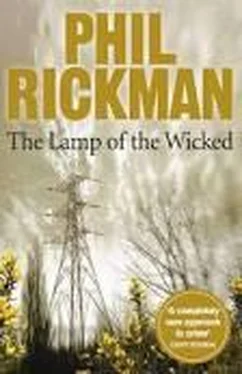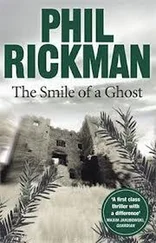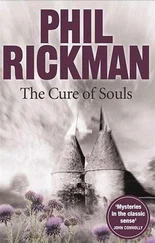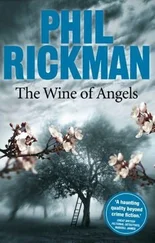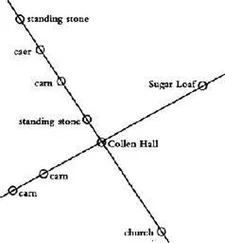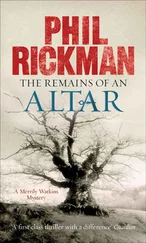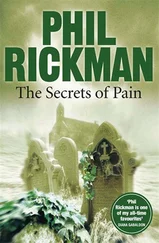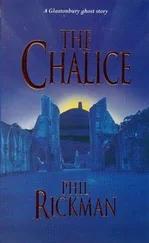Underhowle itself was reported to be in a grey state of communal shock. Nearly a hundred people, including children as young as five and six, had heard Roddy Lodge confess, then watched him die. Many were being treated and counselled for the trauma.
And the shock waves radiated outwards.
TRACKS OF THE BORDER BEAST.
On the third day, most of the headlines were variations of this one from the Mail . Where had Roddy Lodge been? Where might he have interred the bodies – Is there a corpse under YOUR septic tank? the Mail asked. The speculation now was that this was a false trail: cold-storing the body of Lynsey Davies in the pea-gravel under the Efflapure had been a one-off emergency measure – maybe Lodge had felt in danger of discovery at the time. Anyway, there would surely have been better options open to a killer with his own JCB.
So the other bodies could be anywhere.
All over Herefordshire and the Forest of Dean, this particularly was a live issue, and Merrily had felt obliged to address it, had assembled a sermon around the life and death of Roddy Lodge. Why did such people exist? Why had God created serial killers?
A difficult one. Why exactly?
It was certainly not a question voiced by the grateful papers, as the search for bodies went on, as police interviewed and reinterviewed the relatives of missing women and girls across five shires, as press and TV cameramen prowled Underhowle, reporters free to speculate now that the killer who had confessed so publicly was never going to face trial.
And the police, in this case, were… who exactly? No mention in the papers of Bliss. Or indeed of DCI Annie Howe. All the press briefings had been given by a Detective Superintendent Luke Fleming. Merrily had never heard of him – must have been from Headquarters. She noticed that there was nothing in any of the papers about Roddy’s taste in bedroom decor. Given that he was dead, why not?
Every day she’d expected her own involvement in the discovery of Lynsey Davies to be disclosed by the police, but despite the local gossip – inadvertently fuelled by Gomer, she suspected, as he pursued the truth about the fire – nobody had approached her.
This morning, preparing for Holy Communion in the early light, she’d decided to dump the Roddy Lodge sermon. It had seemed unnecessary, gratuitous.
Sermon B, then.
She didn’t sit on the hassock, but she didn’t go into the pulpit either; she stood at the side of the lectern.
‘Erm…’
She felt obscurely nervous; she really needed notes for this one, but there was nowhere to conceal them. And because pews were filled further back than of late, she had to project more than she’d become accustomed to. Had to make like a preacher.
‘If we… if we sit down and really think about it, I suspect most of us will remember an occasion when something’s happened, very suddenly, to divert us from a certain course of action. Maybe a flat tyre that stopped you making a particular journey. And then, some time later, you find out that that journey might have led you into a far bigger crisis – a motorway pile-up, or some confrontation that you might not have been able to handle. And then you say – and how often have most of us said this…?’
She leaned out, an arm around the stem of the lectern, found herself locking gazes for a second with James Bull-Davies, three pews from the front.
‘… Perhaps it was meant .’ She stepped back. ‘That’s a useful phrase, isn’t it? Meant by whom? By God? And why should God single us out for salvation? Why should we be diverted from the pile-up that’s going to kill or injure several other people?’ Longish pause. ‘For the Christian, there’s… another option. Suppose we think about that phrase in the context of the possibility of there being’ – she smiled faintly – ‘angels among us.’
Jenny Box was close to the front, to Merrily’s right, washed in amber light from the circular stained-glass window in which a clutch of apples was pensively surveyed by several angels. Jenny Box, with her fine old-gold hair under a small white hat that was almost a skullcap, her eyes unblinking but also unfocused, as if gazing into the ether. Merrily wondered how Thomas Aquinas would have handled this.
‘What do I mean by angels? To be quite honest, I’m not sure. Do I mean heavenly forces, agents of change? Powerful, invisible intelligences capable of assessing a situation, seeing the direction it’s going, anticipating the consequences. And occasionally intervening, sometimes as a result of prayer, but often quite spontaneously. Or so it seems.’
Mrs Box was watching her now. Merrily avoided her gaze.
‘We talk about governments being interventionist or non- interventionist – should they step in and overrule market forces or whatever? It’s always a fine balance and, because governments don’t have Godlike wisdom – or much wisdom at all, you might think sometimes – they often intervene over the wrong issues. But we have to assume that angels… that they never get it wrong.’
She hadn’t had time to prepare this properly. She was opening a can of worms. Were angels messengers of God or aspects of God? To what extent were they independent? Was this the time to mention Ledwardine’s own angel? Not the one with the sword allegedly witnessed spreading its radiance over the church in a thunderstorm but the anonymous one with the bin sack full of used fifties. That would take their minds off Roddy Lodge for a while.
Maybe not. Uncle Ted had whispered to her earlier, as they came into church, that he was still awaiting police clearance on the money. If he didn’t hear anything this week he was damn well getting back onto them.
‘The Bible doesn’t go into too much detail about the nature of angels. They just are . Most of us, if we think about them at all, think of them in the context of particular episodes – usually involving halos and harps and a few gobsmacked shepherds. Or we might mention – with a shiver – something we like to call the Angel of Death, which…’
Merrily looked up at the stained-glass window with the apples. The angels there were solid and looked female, with their extravagant golden curls and small pursed lips.
‘… which we always see as something horribly sinister rather than something gentle and understanding which exists to guide us through what, for most of us, is the only situation since birth in which we are one hundred per cent helpless.’
Jenny Box had lowered her gaze. Merrily thought of all the hospital beds she’d sensed to be enfolded in dark, downy wings. But then – the thought pierced her like a thin blade – what was the Angel of Death doing when the face of Lynsey Davies was turning blue under the savage pressure, her eyes bulging, her tongue —
‘I… As far as I know, I’ve never seen an angel. So I really can’t tell you if they look like the ones in the windows over there – if they’ve got actual wings, or if they’re light and vague, or as invisible as breath. I suspect that angels look… just like us.’
And how many others are dead? Nobody knows. And why? Nobody knows.
‘Some people do claim to have actually seen them in times of crisis, some to have… sensed them.’
She swallowed. Lifted her eyes and her thoughts. Had she sensed them? At her shoulder during a Eucharist? Once, perhaps, on Christmas Day, in an aura of profound holiness, as the bells awoke the valley?
‘Most of us, though, have only seen evidence of what appears to be a practical intelligence which comes out of nowhere to… alter a situation . Now that in itself – that’s such an amazing concept, such a Superman thing, that it’s easy to get carried away, to start looking for angels, looking for evidence of angelic intervention in everything, every little situation.’
Читать дальше
